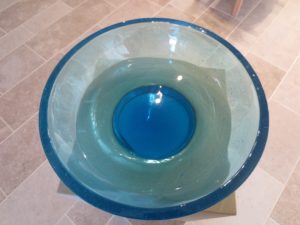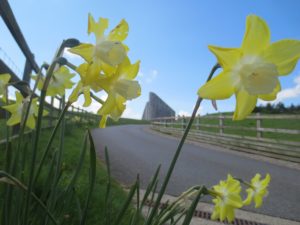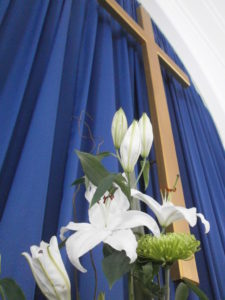
‘So are you a nun then?’ a woman asked me as I sat in the grounds of Byland Abbey in North Yorkshire. Maybe that’s not an unreasonable question unless you know it’s been a ruin since is was ‘dissolved’ by Henry VIII. After all you do see a few Religious about in these parts with Ampleforh and Stanbrook nearby. I saw two monks in the tea shop and I understand from an Ampleforth student they visit the local pubs too, bit like Jesus really.
But I’m not a nun by the usual definitions. Not poverty, chastity or obedience or any habit to speak of, although I do have my Benedictine tendencies, which explains something of why I was on retreat at Stanbrook. They started when I was in my mid twenties and searching my own vocation. A kindly Essex vicar, having heard my muddled and tear stained story, suggested a retreat at St Mary’s Abbey, West Malling, in Kent. It’s an Anglican Benedictine house and wonderfully welcoming. As soon as I arrived in the guest house I felt at home with its prayer window into the Gate House chapel. I learnt about the hours and how to do lectio divina, both of which are still the foundation of my daily life in my Reformed way.
A retreat doesn’t have to be highly structured. Just going to the services can be a calming and renewing experience. Lavinia Byrne, a Catholic Religious I knew, once wrote ‘When you’re very extroverted, as I am, you need periods of quiet, otherwise you go into orbit. I suppose in chapel I was getting out of orbit’.
Like her I need that too, and I often find it in the school chapel during the school day, but once a year I take a weeks retreat to ‘get out of orbit’ a bit. At Stanbrook, a Catholic Benedictine house, a sister puts the service sheet for the hours out on the table for me to pick up, marking up the correct pages for Lauds at 7.30m on Bede’s Day (25th May), as it’s a bit more complicated. Bede (673-735), a monastic of the north, wanted us to know ‘of God’ rather than ‘about God’; a good priority in these missionary days. Vespers are in Latin so translation is provided. Joining in is a silent thing for the most part, as the chants are not known to me, although there are also some spoken bits. My favourite service of the day is Compline, before night fall, with the Nunc Dimitis, blessing before sleep and the Great Silence, which is kept until the next morning. On Wednesday evening it is my favourite Psalm, 139 in our psalter (138 in theirs). I let the words flow around me and seep into me, mending the bits that have recently got broken, soothing the older wounds again, reassuring me. And of course alarming me: the ending is quite blood thirsty but then the psalms are like that, timeless prayers for every day, at least if you are a Benedictine.
My retreat this year is another period of discernment. It’s something all of us should continually attend to: where is God calling me? After a period of 5 years service as a school chaplain, do I continue there or do I look elsewhere? What does the still small voice have to say about it? In many ways the chaplaincy work seems unfinished, but then in most situations there is more that could be done. I read about lots of other Religious women trying to understand their vocations. Most did not appear all that obedient, their views and beliefs often at odds with official versions. As a Daughter of Dissent, I seem to be in good company.
Helen Waddell wrote about some unfinished work; she was tired and uncertain about whether to continue. After some thought and reflection including a service she had attended and prayer that had been offered there, she came to the conclusion that she should finish the work she had started, whatever it was. She wrote to her sister, Meg, saying ‘I have begun to feel a kind of rustling amongst the leaves’ . Stanbrook is set in lovely woodland, with many paths to follow through the trees. In May everywhere is beautifully carpeted with wild flowers providing a strong connection to Creation in this sustainable Abbey. They also make chocolate.
Psalm 139 ends with ‘See that I follow not the wrong path’. I take my Benedictine tendencies and my Reformed ways with me and I get on the bus back to York. ‘Are you nun then?’ Sort of, in much the same way as this is a sort of postcard.
Janet Lees/May 2016
urls for retreats and Stanbrook lodges.
http://www.cottageguide.co.uk/crieflodges/
http://www.retreats.org.uk




